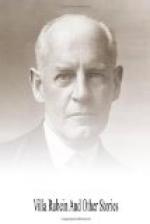About this time Mrs. Decie, his wife’s sister, whose husband had died in the East, returned to England; Paul invited her to come and live with them. She had her own rooms, her own servant; the arrangement suited Paul—it was economically sound, and there was some one always there to take care of the girls. In truth he began to feel the instinct of the “freeman” rising again within him; it was pleasant to run over to Vienna now and then; to play piquet at a Club in Gries, of which he was the shining light; in a word, to go “on the tiles” a little. One could not always mourn—even if a woman were an angel; moreover, his digestion was as good as ever.
The fourth quarter of this Villa was occupied by Nicholas Treffry, whose annual sojourn out of England perpetually surprised himself. Between him and his young niece, Christian, there existed, however, a rare sympathy; one of those affections between the young and old, which, mysteriously born like everything in life, seems the only end and aim to both, till another feeling comes into the younger heart.
Since a long and dangerous illness, he had been ordered to avoid the English winter, and at the commencement of each spring he would appear at Botzen, driving his own horses by easy stages from the Italian Riviera, where he spent the coldest months. He always stayed till June before going back to his London Club, and during all that time he let no day pass without growling at foreigners, their habits, food, drink, and raiment, with a kind of big dog’s growling that did nobody any harm. The illness had broken him very much; he was seventy, but looked more. He had a servant, a Luganese, named Dominique, devoted to him. Nicholas Treffry had found him overworked in an hotel, and had engaged him with the caution: “Look—here, Dominique! I swear!” To which Dominique, dark of feature, saturnine and ironical, had only replied: “Tres biens, M’sieur!”
III
Harz and his host sat in leather chairs; Herr Paul’s square back was wedged into a cushion, his round legs crossed. Both were smoking, and they eyed each other furtively, as men of different stamp do when first thrown together. The young artist found his host extremely new and disconcerting; in his presence he felt both shy and awkward. Herr Paul, on the other hand, very much at ease, was thinking indolently:




